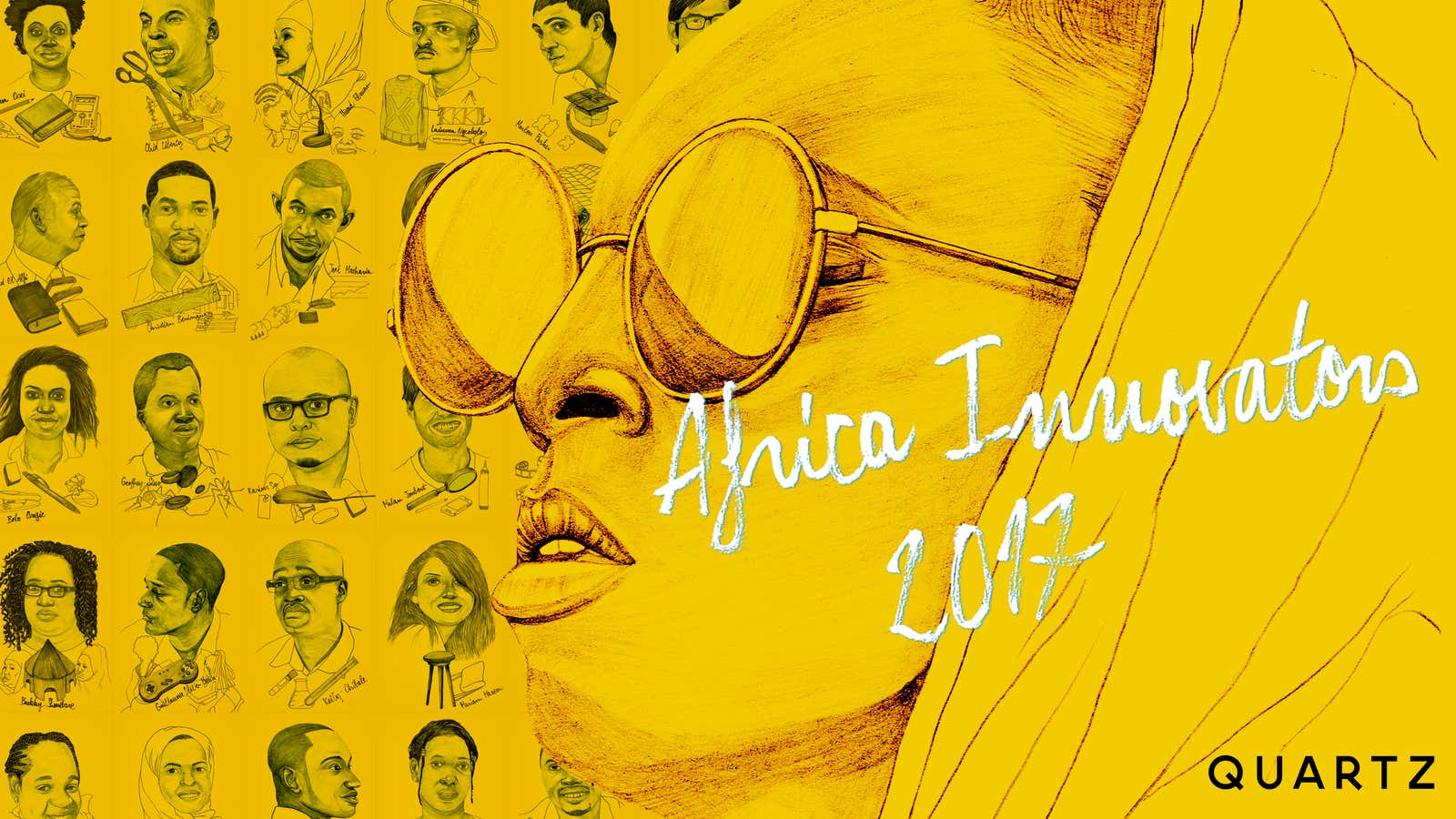Durban, South Africa
The influence of innovation on African countries’ developmental progress continues to be one of the most frequently discussed topics at high-powered meetings like this year’s World Economic Forum Africa.
Many of the discussions on panels or in private conversations with presidents and captains of industry and leaders of social causes often come down to finding new approaches and principles to tackle many of the intractable challenges faced on the continent.
Such new approaches underlie our philosophy in picking people for Quartz’s third edition of the Africa Innovators list. The word innovation is often linked with technology alone, but since our inaugural list our innovators have always been people with “big ideas, creative vision, entrepreneurship and homegrown, globally scalable problem-solving.” This year is no different.
Many wonder about the fate of Africa in 2017 when several of the world’s leading powers, like the US, have turned their focus inward. Yet, we’ve again identified more than 30 Africans who aren’t waiting for help from the outside. The influence of their work goes well beyond their immediate community and will ultimately impact millions of lives. They’re taking leadership and control in a wide range of fields including finance, healthcare, education, agriculture, design and many other fields.
The Quartz Africa team is especially proud of the women and men on the 2017 list; it’s our most widely represented group of innovators yet, picked from 18 countries. As with our 2016 and our inaugural 2015 innovators, it has been inspiring for us to follow the dedication, determination, and creative enterprise of each person here.
We congratulate everyone and recommend that you take time to follow their impressive work.
—Yinka Adegoke, Quartz Africa editor
Table of Contents
Innovators
Nicole Amarteifio ● Senam Beheton ● Yasmin Belo-Osagie & Afua Osei ● Christian Benimana ● Kelly Chibale ● Oscar Ekponimo ● Ahmed El Alfi ● Ilwad Elman ● Temie Giwa-Tubosun ● Mariéme Jamme ● Malan and Philip Joubert ● Selly Raby Kane ● Chid Liberty ● Joel Macharia ● Guillaume Olivier Madiba ● Lilian Makoi ● Charity Chao Mbogo ● Walid Sultan Midani ● Titos Munhequete ● Nontsikelelo Mutiti ● Laduma Ngxokolo ● Nana Oforiatta Ayim ● Tayo Oviosu ● Marlon Parker ● Rapelang Rabana ● Hend Riad and Mariam Sherif ● Bukky Shonibare ● Geoffrey Siwo ● Karim Sy ● Kwami Williams
Essays & ideas
● The key to innovating education in Africa will be to innovate its financing, by Strive Masiyiwa
● M-Pesa, Uber and the true meaning of Africa’s technological disruption, by Calestous Juma
● Can the Nigerian designer of the Chevy Volt revitalize his country’s auto industry?, by Yomi Kazeem
● Funding shouldn’t be used as a rubber stamp for innovation, by Lynsey Chutel
● How to build a futuristic African video game industry using myths and tales from the past, by Abdi Latif Dahir
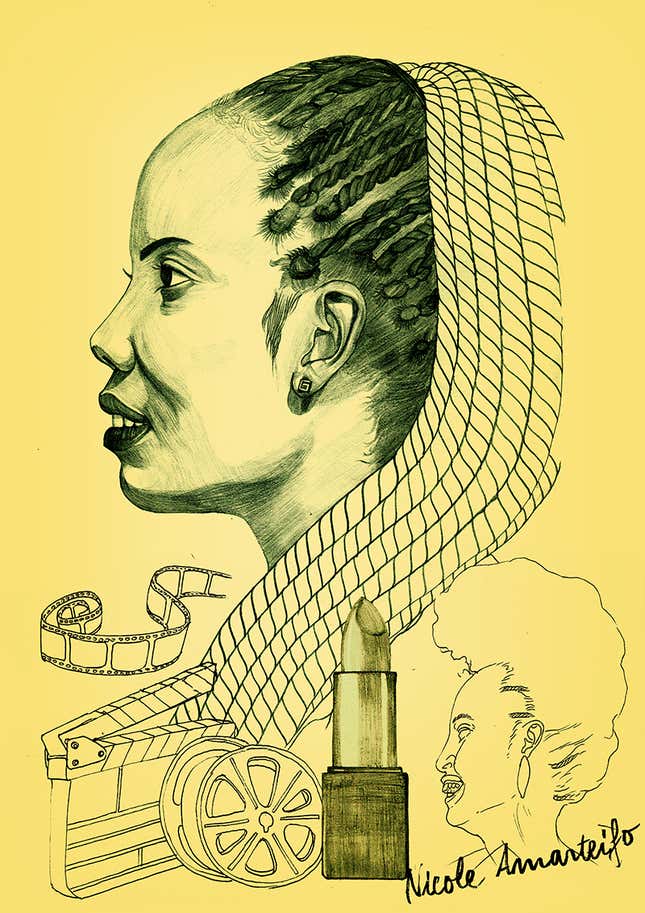
Nicole Amarteifio
Creator, An African City online video series
@AllThingsAfrica
Ghana
The online video series has been dubbed “the African Sex and City,” but An African City goes beyond that. Created by Nicole Amarteifio, the popular web series offers a witty and often poignant narrative of five ambitious women who have returned to Accra as “repats.”
Amarteifio’s background in international development—she’s done stints at the World Bank and the United States African Development Foundation—and her desire to hear Africans discuss their own issues drives the script. Fashion is also an ever-present influence, with the wardrobe specifically sourced from African designers.
“It’s the story I know. And the story of many of my peers,” Amarteifio told Quartz. “I thought it was worth telling. I thought it was worth seeing on screen.”
Despite this familiarity, she initially struggled to pique the interest of the few people she knew in the film and television industry. So, she poured her savings into creating her own web series.
At first, Amarteifio assumed her audience would be her peers, but then the hits started coming in from all over the world. Season one was so successful that raising funds for season two was far easier, and she’s already in talks with TV networks for season three. In the meantime, 35-year-old Amarteifio is also working on her first film and a political drama series set in West Africa.
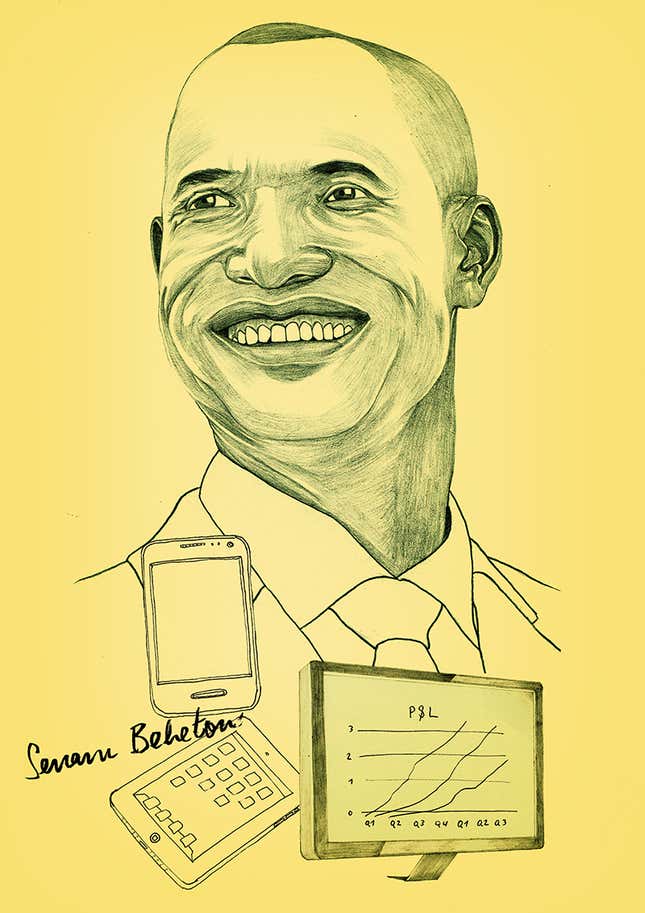
Senam Beheton
Founder and executive director, EtriLabs
@SenamBeheton
Benin
Advancement in information technology has provided innovative ways for people, even in remote locations, to solve some of the serious challenges they face. Senam Beheton can attest to this, as founder of the Benin and Senegal-based EtriLabs, a space where people from different backgrounds can work, network, and co-create, and tackle problems using disruptive technologies.
With programs supporting youth in nine other Francophone African countries, Beheton believes young Africans armed with information and skills can create great value with very little resources; transforming their own destinies and the prospects of their communities.
“The wealth of Africa is in the many problems it faces. If we start being very passionate about finding innovative solutions to problems, we create value, we create wealth and we improve lives,” he tells Quartz. “The more challenges there are, the more digital activists and entrepreneurs I can support.”
EtriLabs’ 500-plus registered members have an average age of 23 and are mostly women. The women are especially trained in programming, design, digital marketing and entrepreneurship to prepare them for a future in tech. Beheton has also involved children in the innovation space by offering computer programming training.
“Seven years later, we have impacted thousands of young people,” says Beheton, “and] supported the creation of products used by millions around the world,” including by Fortune 500 companies.
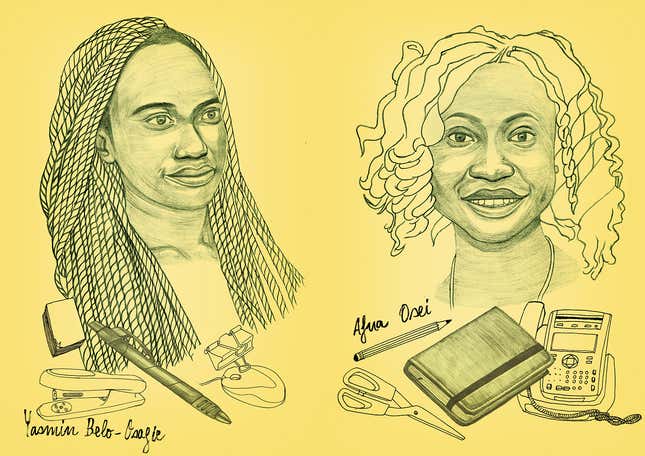
Yasmin Belo-Osagie & Afua Osei
Co-founders, She Leads Africa
@SheLeadsAfrica
Nigeria/Ghana
For many young women climbing the corporate ladder, the way to the top can be lonely—this is especially true in Africa. The number of African female entrepreneurs and leaders in big business has certainly increased from just a generation ago, but there are still relatively few women “leaning in,” and those who do get little support.
With She Leads Africa, Yasmin Belo-Osagie and Afua Osei have created an online network of encouragement and inspiration to support the business ambitions of African women. The site offers tips and webinars from experts, and master classes from female leaders in fields ranging from fitness to the mining industry.
From its inception, Belo-Osagie and Osei wanted She Leads Africa to be a real world experience, pairing the site with skills-sharing workshops and networking events. Hundreds of women have attended the #SheHive tour in cities like Nairobi, Johanesburg, Lagos, Accra, New York, and London.
They also aim to create opportunities for women-led startups through an accelerator program in Nigeria. Belo-Osagie and Osei have clearly internalized the lessons their platform teaches, drawing from their own experiences as ambitious young women trying to make an impact in Africa.
“Launching your own business, especially in a developing market, is very different from being a consultant at a corporate,” says Belo-Osagie, a McKinsey alumni. “You need to step away from the pages and models and step into real life—and most importantly, you have to get comfortable with risk.”
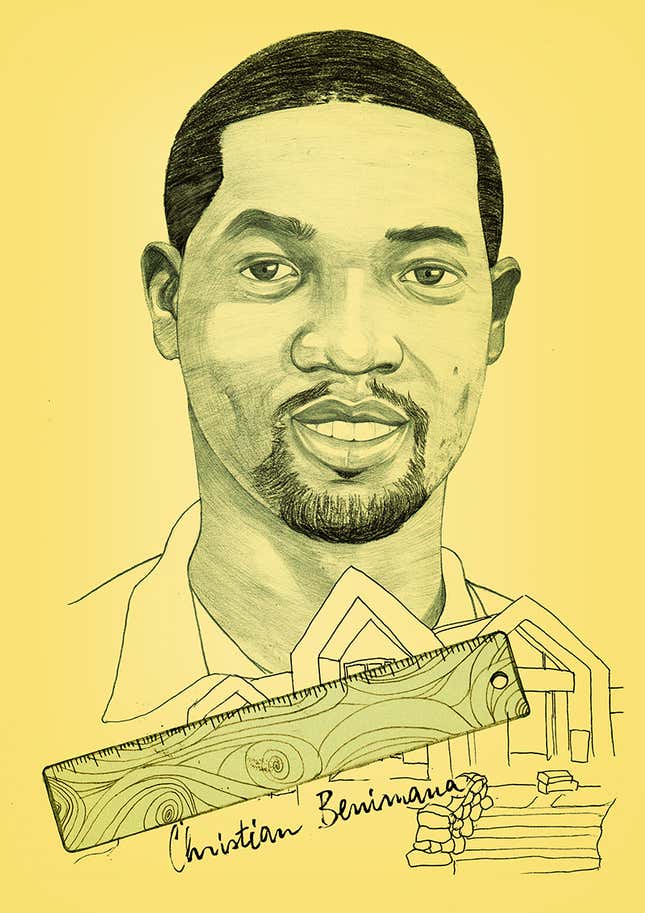
Christian Benimana
African Design Centre, head
@CBenima
Rwanda
Christian Benimana is training the next generation of African architects and designers at the African Design Centre, an apprenticeship program in Kigali. Africa’s population will double by 2050 and the schools, housing, and infrastructure needed far outstrip Africa’s population of design professionals. There are 75 more architects per capita in the US than in East Africa, the design center estimates.
“Architecture is not just about building design, but also about the implementation of a dignifying process that creates long-term impact,” Benimana says.
Benimana has taught at the Kigali Institute of Science and Technology, and is chair of the Education Boards of the Rwandan Institute of Architects and the East African Institute of Architects. He was the project manager for the construction of a pilot maternity ward in Malawi designed to resemble a village. He studied at the School of Architecture and Urban Planning of Tongji University in Shanghai, China.
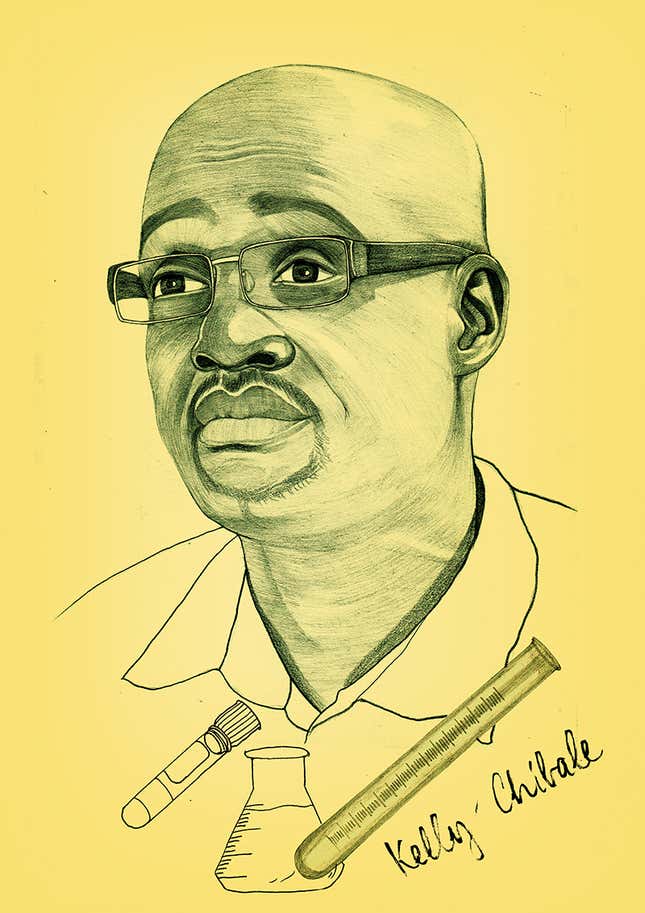
Kelly Chibale
Founder/director H3D, University of Cape Town
Zambia
Chibale is working with African scientists at H3D, Africa’s first drug discovery and development center, to solve one of the continent’s biggest health problems: it’s home to 90% of global deaths from malaria. Chibale and his team have discovered two anti-malarial compounds that have the potential to fight the malaria parasite at all three stages of its life cycle.
H3D, based at the University of Cape Town, started in 2010 with just five post-doctoral researchers. It now has more than 50 scientists working in chemistry, biology, and pharmacology. Using H3D’s multidisciplinary approach, Chibale, a Zambian, hopes to build a pharmaceutical industry in South Africa that addresses diseases endemic to Africa, long ignored by global pharmaceutical companies.
“We Africans should look critically at ourselves first and foremost before we can even start to think about blaming others for our problems,” Chile told Quartz. “We Africans will continue to struggle and lag behind the rest of the world in using science for development if we do not create good local R&D infrastructure and supportive environments.”
Chibale has a PhD in synthetic organic chemistry from the University of Cambridge and has done post-doctoral work at the University of Liverpool and the Scripps Research Institute in California. He was also a Fulbright senior research scholar at the University of Pennsylvania’s School of Medicine.
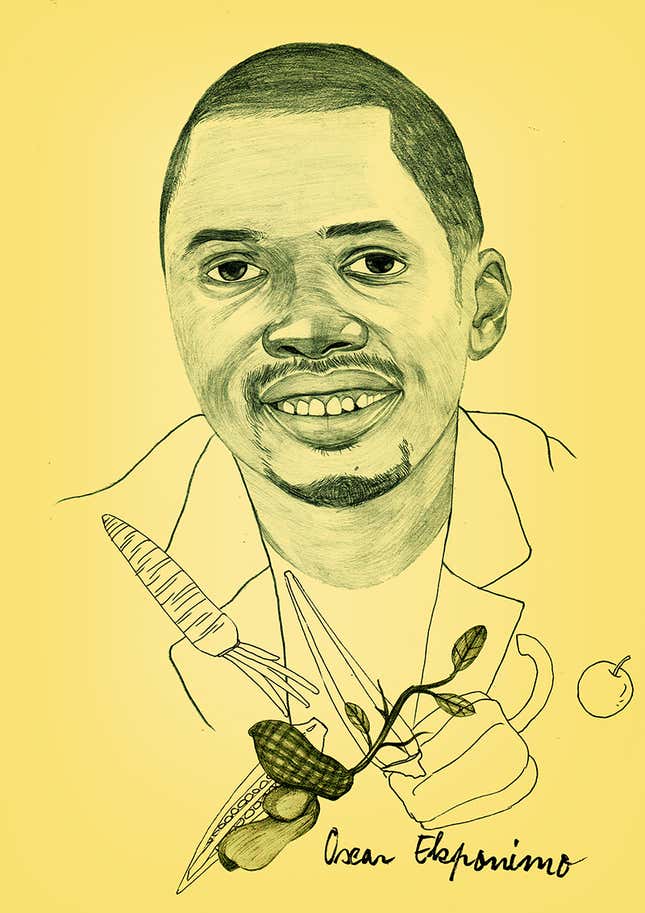
Oscar Ekponimo
Founder, Chowberry app
@ekponimo
Nigeria
Many startup founders often begin with grand-scale ambitions of disrupting an industry and establishing a new world order, but Oscar Ekponimo started his Chowberry app to ensure that fewer people would go to bed hungry, like he did as a child. Growing up, Ekponimo, a software engineer, often lived on one meal every two days.
To solve that problem for some of the estimated 13 million Nigerians who suffer hunger every day, Ekponimo’s Chowberry app helps grocery stores manage their food inventory, and alerts them when items are close to their expiry dates. In turn, the grocery stores offer those items at discounts of “up to 75%” to customers, usually welfare and aid agencies, through the app. These organizations then distribute the food to orphanages and low-income households. Chowberry charges retailers a fee for managing their inventory.
Currently operating in Lagos and Abuja, Ekponimo hopes the app will reach up to 100,000 households in three years. Crucially, plans are also underway to partner with aid agencies to get food to thousands of internally displaced people in northeastern Nigeria where malnutrition and hunger are rife.
Ekponimo’s work hasn’t just been noticed by the orphanages and households he helps to feed: last year he bagged the Rolex Award for Young Laureates.
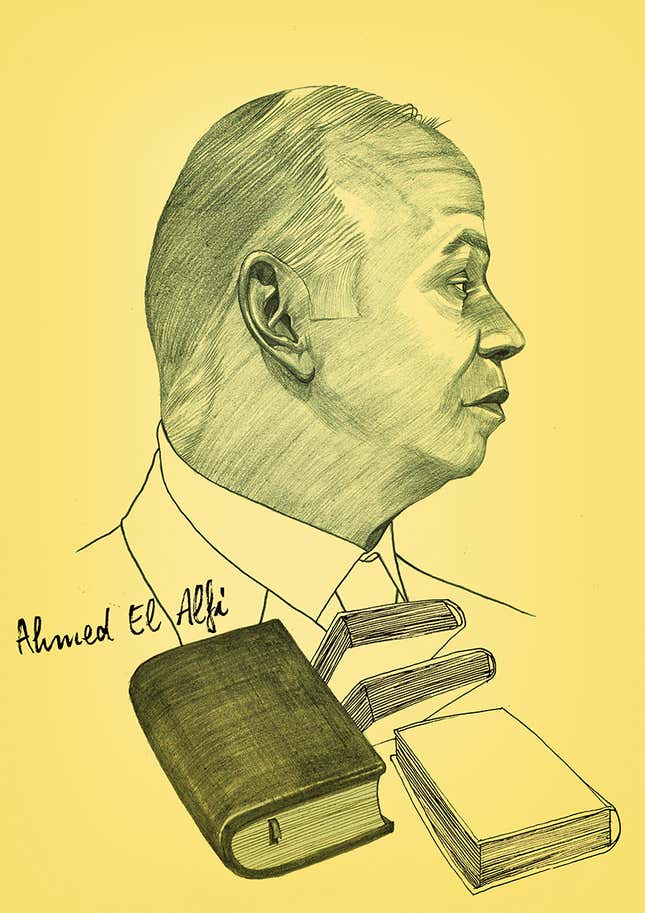
Ahmed El Alfi
Founder, Nafham
@AOAlfi
Egypt
Africa has the unenviable distinction of being home to one of the largest out-of-school populations in the world. The continent’s education system faces key challenges including overcrowded schools, unregistered school systems, dispirited teachers earning meager salaries, poor infrastructure, and hygiene that threatens the safety of school-goers.
Nafham —”we understand” in Arabic—hopes to plug this gap. The Egypt-based online educational service is the creation of Ahmed El Alfi, with co-founders Mostafa Farahat, and Muhammad Habib. Founded in 2012, the service has a free app which crowdsources and curates short video lessons linked to the public educational system in Egypt, Algeria, Saudi Arabia, Kuwait, and Syria. The app’s 23,000 videos are accessed by more than 500,000 users monthly, with teachers answering students’ questions, and checking the veracity of videos uploaded by contributors. The award-winning platform also has more than 350,000 subscribers to its YouTube channel.
El Afli has become an invaluable member of the Middle East and North Africa’s rapidly growing tech industry. He is the chairman of Sawari Ventures, a Cairo-headquartered company that aims to transform regional economies through investments in high-impact businesses. He is also the co-founder of Flat6Labs, a leading regional startup accelerator that provides seed funding, mentorship, and training to hundreds of entrepreneurs and businesses. In 2013, he also founded The GrEEK Campus, Cairo’s first technology and innovation park.
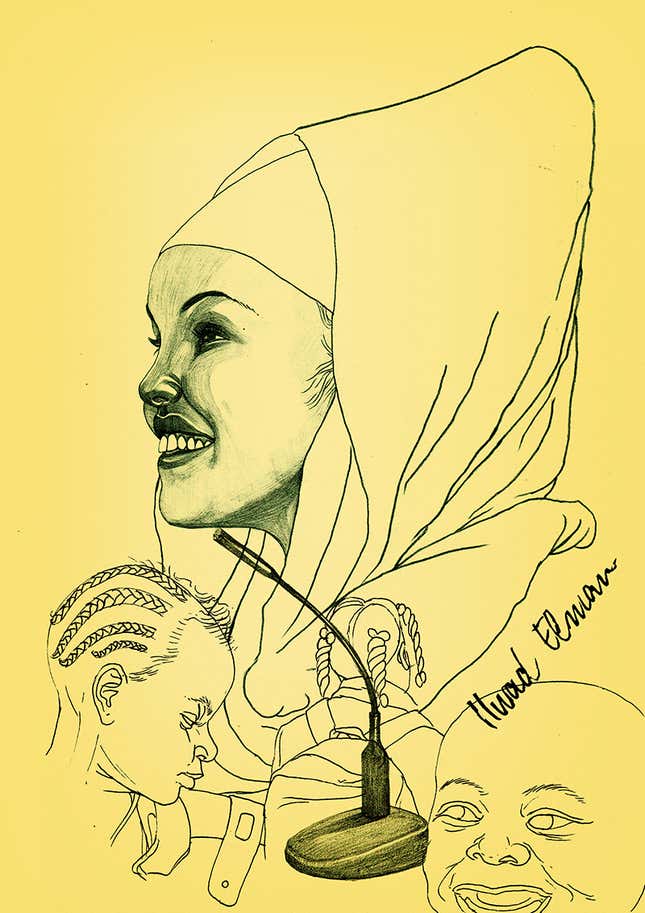
Ilwad Elman
Director, Elman Peace and Human Rights Center
@IlwadElman
Somalia
Ilwad Elman returned to Somalia from Canada in 2010, at a time when large parts of the Somali capital Mogadishu—and much of the south-central regions—were still ravaged by war and controlled by the terrorist group, al-Shabaab. Despite facing huge adversity, Elman quickly gained a reputation for being resourceful among the diaspora returnees who were slowly rebuilding the nation, founding the Elman Peace and Human Rights Center.
As director of programs and development at the center, she oversees a vast portfolio that includes upholding human rights, fighting for gender justice, countering violent extremism, and peacebuilding. The center works to rehabilitate and reintegrate former child soldiers by teaching them vocational skills and instilling an entrepreneurial culture. The 27-year-old is also the director of Sister Somalia, considered the first rape crisis center in the country for victims of rape and sexual assault. In 2012, she also co-organized the first TEDx Mogadishu, an event which continues to document and celebrate the work being done by Somalis to build a better future.
Elman is following in the footsteps of her late father, Elman Ali Ahmed. The ardent peace activist popularized the motto “drop the gun, pick up the pen” before he was killed in 1996, likely as a result of his work. Elman who has garnered global recognition for her efforts, knows too well the dangers inherent in working in and rebuilding a war-torn nation.
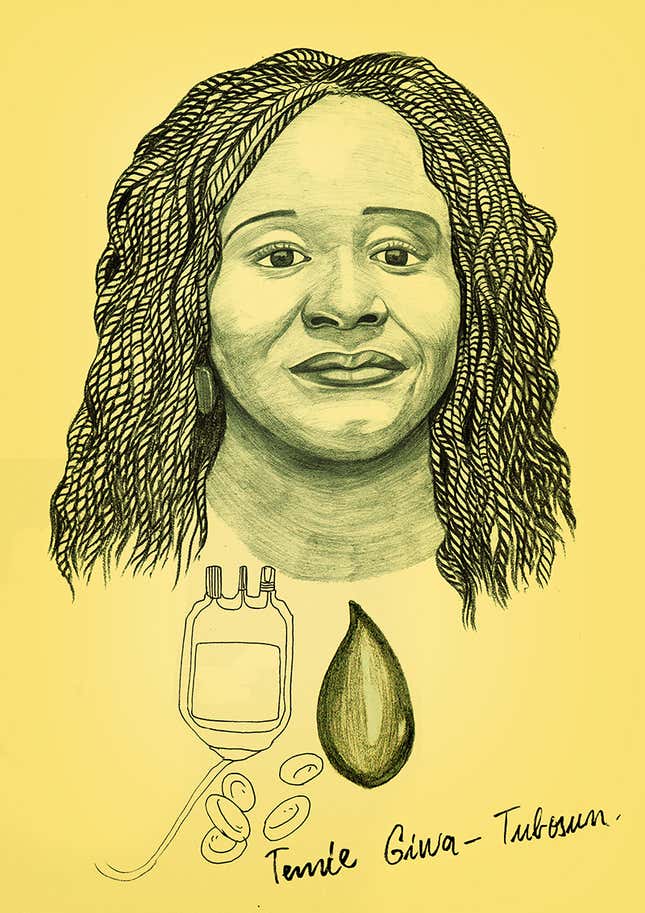
Temie Giwa-Tubosun
Founder, LifeBank
@temite
Nigeria
For much of the past decade, Nigeria’s healthcare system has had a blood supply problem. Shortages at blood banks as well as inefficient preservation and transportation methods have contributed to high mortality rates at Nigerian hospitals. Temie Giwa-Tubosun is tackling that problem head on with her startup, LifeBank.
LifeBank helps hospitals and doctors find and order blood types needed through its marketplace app, which has a database of the available blood supplies at various blood banks in Lagos. Also, using WHO-approved equipment and procedures to preserve blood in transit, LifeBank transports the blood to hospitals, doctors and patients on time and in good condition.
Since its founding in January last year, LifeBank has helped meet the city’s urgent need for blood that is reliably and safely transported from its donation to its transfusion, moving almost 2,000 pints of blood and saving “up to 900 lives” in the process.
Giwa-Tubosun, who was recently named a “breakthrough female innovator” by the World Economic Forum, wants to grow the company’s capacity and move 100,000 pints of blood over the next two years. And she’s got good reason to be optimistic about the startup’s potential to grow. Facebook’s Mark Zuckerberg met with Giwa-Tubosun and her team during a visit to Nigeria last year, and expressed confidence in the startup’s potential to scale globally.
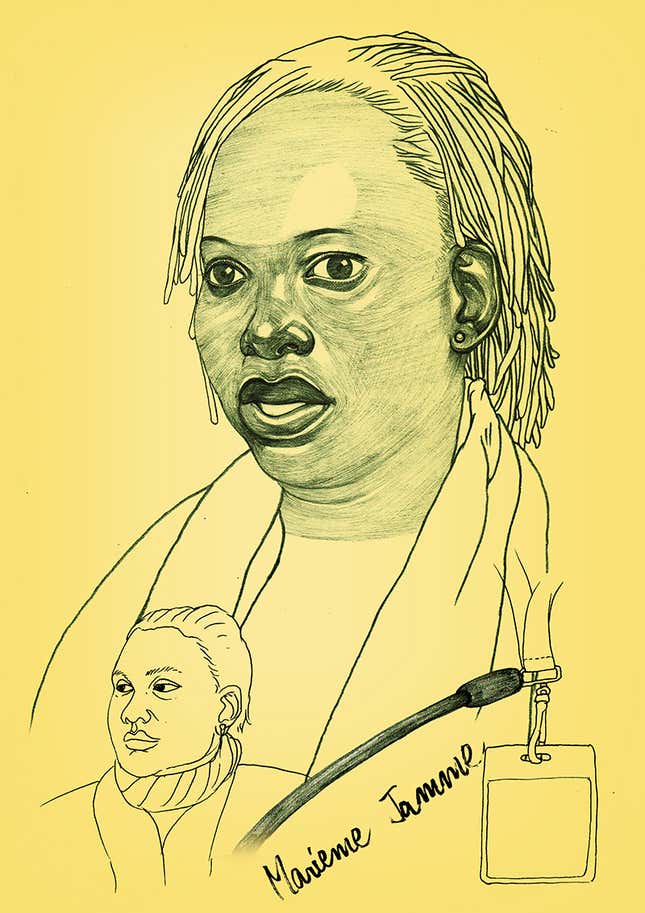
Mariéme Jamme
Founder, Spotone Global Solutions
@mjamme
Senegal
Many global enterprises have looked to expand into Africa, Asia, and the Middle East but are unaware of how to do so. Some of the challenges holding them back include lack of local or cultural knowledge, and difficulties finding the right manpower to work in a market that is totally new to them.
London-based Senegalese entrepreneur Mariéme Jamme founded Spotone Global Solutions to help them navigate these obstacles. She says she is inspired by her clients, “who see Africa as an investment frontier and want to explore the market.”
“The vision is shared as we to want to have partners coming to Africa and doing business in the continent,” she says.
Jamme has supported many large entities in this endeavor, including Google, Microsoft, Ernst & Young, UN Women, Legatum Institute, the Kofi Annan-chaired Africa Progress Panel and the Obama administration.
An ardent champion of women’s empowerment, she helped establish the JJiguene Tech Hub in Senegal to support young women studying science, technology, engineering and maths. Her latest campaign, Iamthecode, aims to mobilize governments, businesses, and investors to support one million girls and young women to be computer programmers by 2030. She has also partnered with a team of African leaders to create Accur8Africa. The initiative will help governments, civil society, entrepreneurs, and businesses evaluate progress on the UN’s sustainable development goals, using accurate data.
“Data is a currency in Africa,” Jamme says. “I think for years we were not able to measure progress but now we can.”
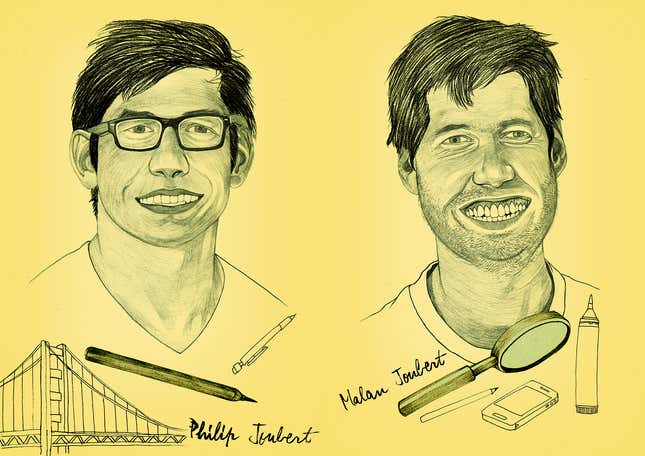
Malan and Philip Joubert
Founders, OfferZen
@malanjoubert, @PhilipJoubert
South Africa
Malan and Philip Joubert love to build things, from apps to successful companies.
The pioneering brothers are behind a number of game-changing innovations. They developed SnapScan, a mobile payment system now run by one of South Africa’s largest banks. Then there was Pondering Panda, a digital research company for Africa, which was sold to Mxit. They were instrumental in the incubation of the mobile app developer JourneyApps and created Apps Against Ebola, which has since evolved into a platform that is contributing to rebuilding life after the crisis.
Right now, their focus is on OfferZen, a recruitment website that works like something of a match.com for developers and companies. They’ve also developed Root, which will allow developers to code their own financial technology apps with a programmable bank account, supported by Standard Bank. On top of that, they’re still running the tech incubator FireID.
Malan, 31, and Philip 29, say they have created so much in such a short time by taking what they call the path of “reverse innovation,” a belief that the most interesting challenges and the innovations that could solve them are happening in the emerging market.
They made their way to Silicon Valley straight out of college. Sleeping on yoga mats in a cramped apartment for nearly two years, they absorbed as much as they could of the US tech scene before returning to South Africa to build and fund their own companies.
“Very often the most successful entrepreneurs are those that aren’t chasing the money,”Philip Joubert told Quartz. “It’s those that are chasing a problem that speaks to them.”
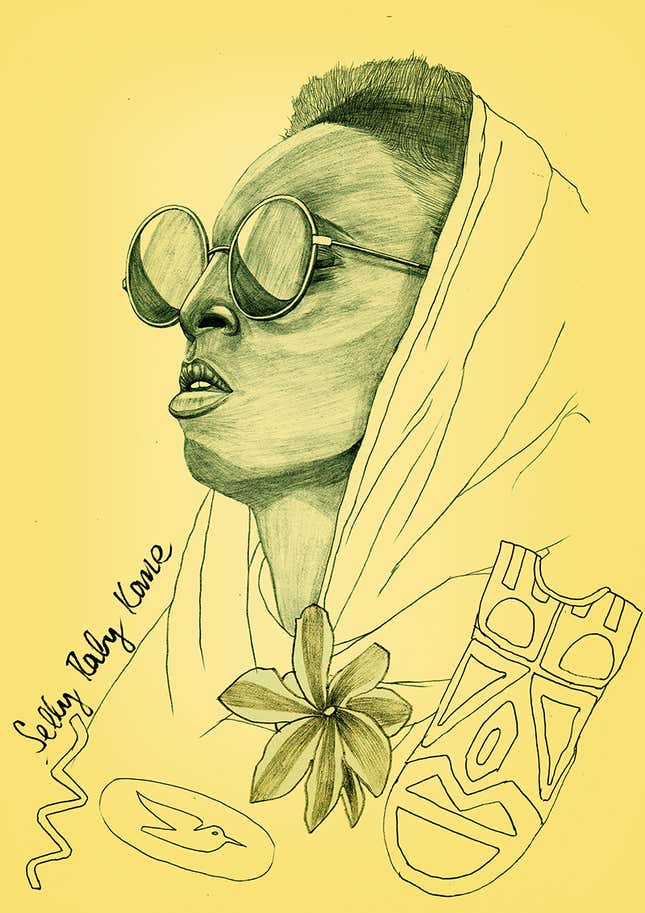
Selly Raby Kane
Fashion designer, multi-disciplinarian
@SellyRabyKane
Senegal
Occupying the intersection between fashion, art, and technology, Selly Rabe Kane believes in the power of the story behind clothes, where collaboration can be as key as design.
2017 is already proving to be a whirlwind year for Kane. She served as guest creative director for the Design Indaba, transforming spaces at the design conference into magical, interactive dreamscapes, was recruited by Ikea to contribute to an Africa-inspired collection, and debuted a 360° film at the Tribeca Film Festival in New York.
Kane was born and raised in Dakar, and studied fashion business in Paris. Her colorful, eclectic designs, which have been known to feature unique materials like fake hair, are beloved by magazine stylists and artists like Beyonce. As co-founder of the multidisciplinary collective Les Petite Pierres, she’s collaborated with other artists on film, music, performances, and events.
“‘It’s a fascinating time to be on the continent, and a critical time to bring change into the stories told to depict it,” Kane said recently. “I see myself contributing to the rebranding of Senegal and the continent by generating niche content.”
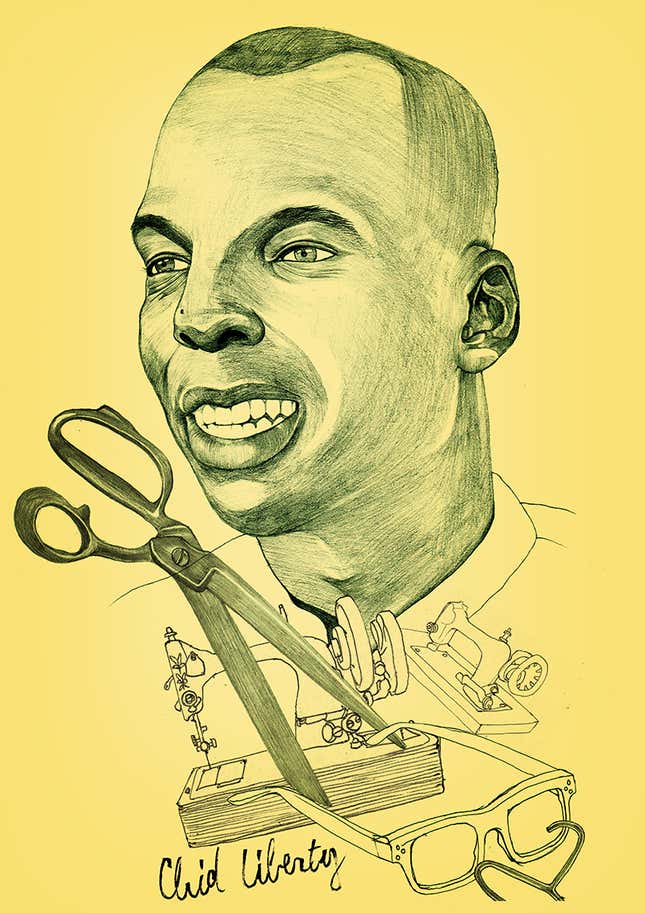
Chid Liberty
Co-founder, Liberty & Justice
@chidegar
Liberia
Chid Liberty was born in Liberia but left the country as an infant with his family when his father was appointed as Liberia’s ambassador to Germany. Subsequent civil wars in Liberia prevented the family from moving back, and they eventually settled in the United States.
The work of Leymah Gbowee, a 2011 Nobel Peace Prize winner who led a women’s peace crusade that helped end the second Liberian civil war, inspired him to establish Liberty & Justice (L&J). In 2009, at 30 years old, he raised about $3 million in start-up funding from US foundations and private investors to establish a Fair Trade Certified garment factory in Liberia. The enterprise provides work and education opportunities for Liberian women vulnerable to unemployment and economic exclusion following the war, which ended in 2003.
His co-founder, Adam Butlein, has been essential to the enterprise. In the early stages, Butlein helped secure much-needed venture philanthropy funding to sustain the start-up, contributing to its success—and the success of the women involved. L&J now supplies clothes and handbags to major American retailers like Prana and Haggar. Its new clothing label, Uniform, launched last year, provides a Liberian child with a school uniform (paywall) for every item sold.
L&J’s latest initiative, Made in Africa (MIA) is a network of ethical factories clustered in Ghana, Liberia and Benin. It looks to establish seven additional fair trade apparel factories in Liberia and Ghana and expand elsewhere on the continent.
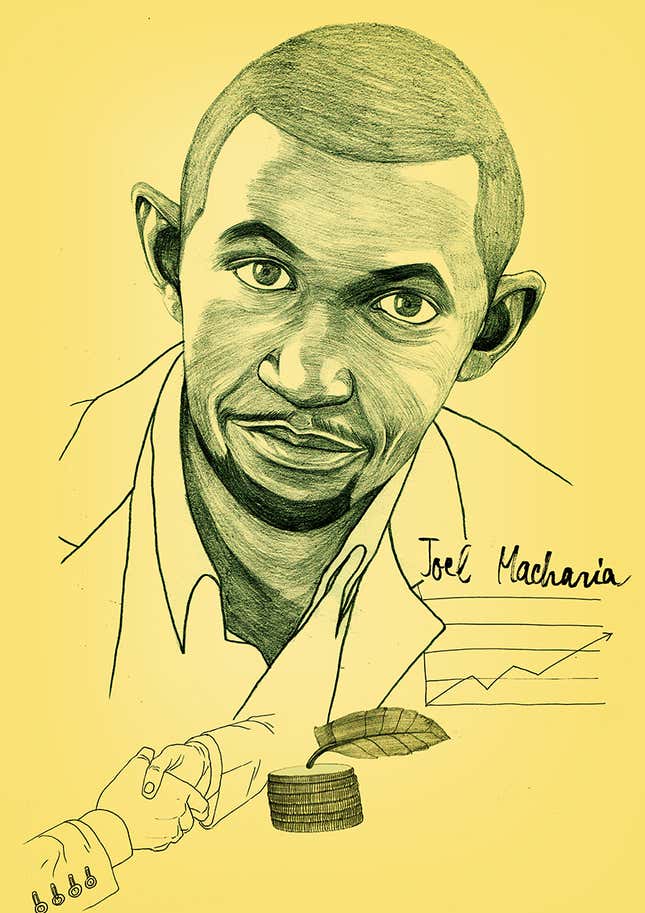
Joel Macharia
CEO/founder, Abacus
@TheMacharia
Kenya
Joel Macharia is the CEO and founder of Abacus, a Kenya-based online investment brokerage that aims to open “pan-Africa markets to pan-African investors.” Macharia, who began investing in stocks in high school, started Abacus with the goal of making the process easier. Through Abacus, investors can set up an account, transfer money, and get news and updates in one place online. The company is working on expanding its reach beyond Kenya to Uganda, Tanzania, Nigeria, and Egypt over the next 12 months.
Abacus is targeting not just investors in Kenya, but the Kenyan diaspora, which sends as much as $3 billion back to Kenya every year, more than what the country receives in foreign direct investment. “There’s a lot of money outside looking for places to go,” says Macharia. Today, Abacus has more than 7,000 users on the platform and hosts classes in Nairobi on investing.
Macharia is also the founder of PesaTalk, which became the largest consumer financial news business news site in Kenya. He has worked in mobile banking for Barclays and Standard Chartered, and was the head of product development for the mobile money team at Cellulant, a digital payments company in Kenya.
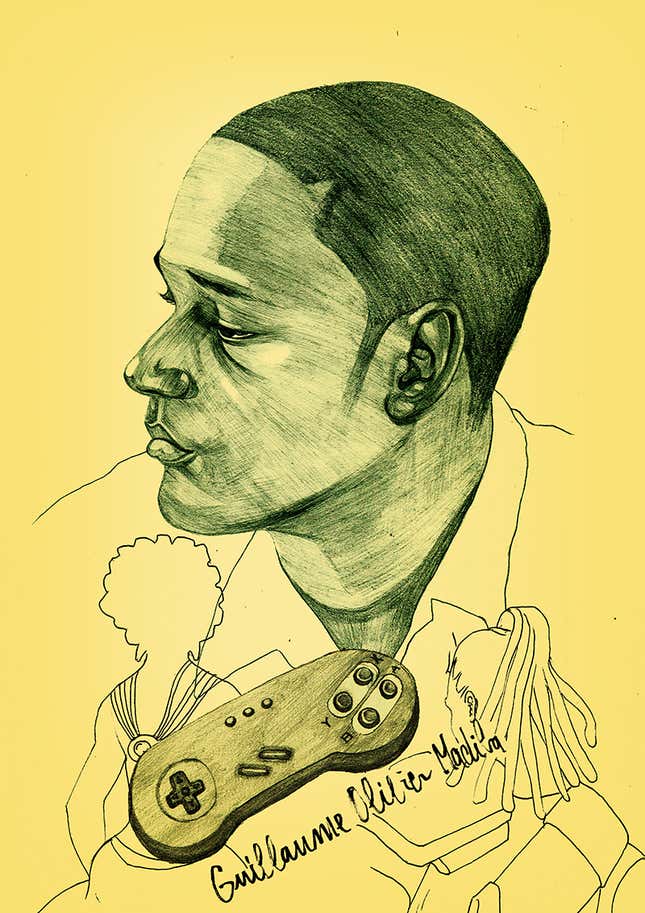
Guillaume Olivier Madiba
Founder, Kiro’o Games
@MadibaOlivier
Cameroon
Kiro’o Games, located in Yaounde, Cameroon, is central Africa’s first games studio. Its CEO and founder, Guillaume Olivier Madiba is the son of a video store owner, and grew up obsessed with video games, eventually teaching himself how to design and develop them. After being rejected by banks and VC firms, Kiro’o raised needed funds for its first title, Aurion: Legacy of the Kori-Odan, by posting videos on Youtube and holding a Kickstarter campaign.
Kiro’o is part of a movement, borne out in comics, literature, and art, to give Africans more stories and superheroes that speak to their realities. Madiba doesn’t claim to be “reinventing the wheel” with his studio’s first game, but says that Kiro’o’s games offer a unique blend of African mythology and traditions (Kiro’o comes from the Swahili expression Kiroho Maono, or “spiritual vision.”) Aurion, a two-dimensional fantasy role playing-game that revolves around an exiled African prince and his princess trying to reclaim their throne, is based on “how the world would be if Africa was at the top,” Madiba has previously said. Madiba is now working on expanding their games to smartphones.
Madiba has a degree in computer science from the University of Yaounde and was a 2016 Mandela Washington Fellowship program.
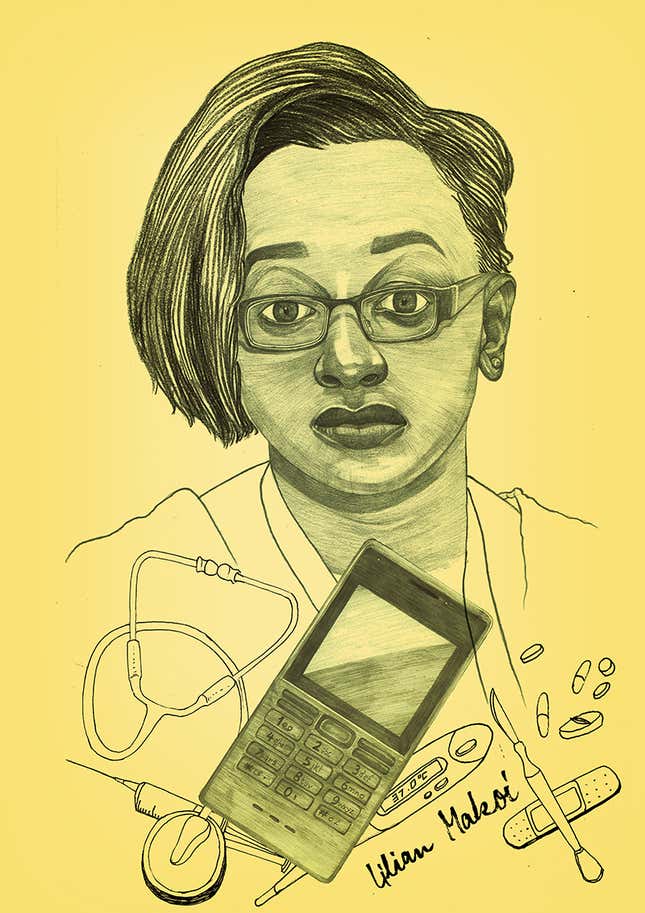
Lilian Makoi
Founder and CEO, EdgePoint Company Ltd
@lilly_makoi
Tanzania
The uptake of insurance products across many countries in sub-Saharan Africa is nothing to write home about. In a country like Tanzania with 50 million people, for instance, insurance penetration is at about 1%. High poverty rates make insurance products not only unaffordable to those at the bottom of the pyramid but also commercially unattractive to underwriters. This means households often struggle to meet their basic healthcare needs.
This state of affairs so troubled digital technology entrepreneur Lilian Makoi that she developed Jamii, a micro-health insurance product targeting low-income earners. She knew that selling insurance to this category of people, even for just $1 per month, was a tough undertaking. But this did not dampen her spirit.
Mainstream insurance players often cite high administrative costs, mostly relating to registration and provision of cards, as hindrances to covering the poor. Doing these procedures through mobile phones would eliminate a lot of these costs. Jamii has partnered with Jubilee Insurance to provide this service, using Vodacom’s mobile money platform to collect insurance premiums and pay medical facilities.
“Accessing medical services from private clinics was a dream to most of our customers,” Makoi tells Quartz. “But, some women get to experience hospital birth for the first time because of Jamii.”
Educating Jamii’s target market about the need to take up insurance isn’t easy, a challenge faced by all African micro-insurers. At the moment, 10,000 people have signed up to the product. Makoi hopes to reach 100,000 users by 2018, with a goal of 3 million across Tanzania and elsewhere in Africa over the next five years.
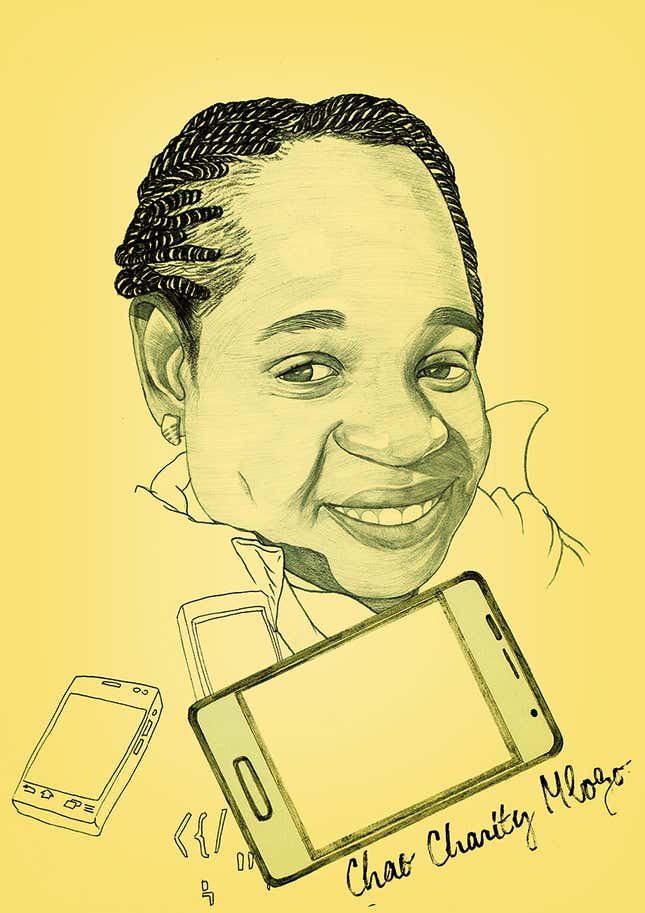
Chao Charity Mbogo
Lecturer, Kenya Methodist University
@evangelinechao
Kenya
Mobile phones have opened up opportunities to millions of people across Africa in ways that are still surprising researchers. Dr. Chao Charity Mbogo, who designed a mobile scaffolding application that helps students learn programming via mobile phones, knows this too well.
The Kenya Methodist University lecturer and researcher is a crusader for African women in tech. She acknowledges the challenges students at universities across Africa face in accessing computers to develop or refine their programming skills. Luckily, many students own cell phones, which can help them learn invaluable computer skills.
“Students need access to tools that they can use to learn programming by actually writing code and not just reading code. The scaffolded programming environment offers this experience,” Mbogo tells Quartz.
The mobile scaffolding application was the result of Mbogo’s doctoral research (pdf) at the University of Cape Town in South Africa, where she graduated in 2015. It is presently accessible only on Android platforms but she hopes to make it available to iOS and Windows phones in the near future.
From May this year, her programming students will officially use the mobile application as part of the class.
“The idea is to not only test the use of the scaffolding techniques to support programming on mobile phones, but to also give the students an opportunity to use their mobile phones to learn programming,” Mbogo says.
As long as African universities continue to struggle with resources, the technique she has developed is a relatively inexpensive way to nurture young programmers in Africa.
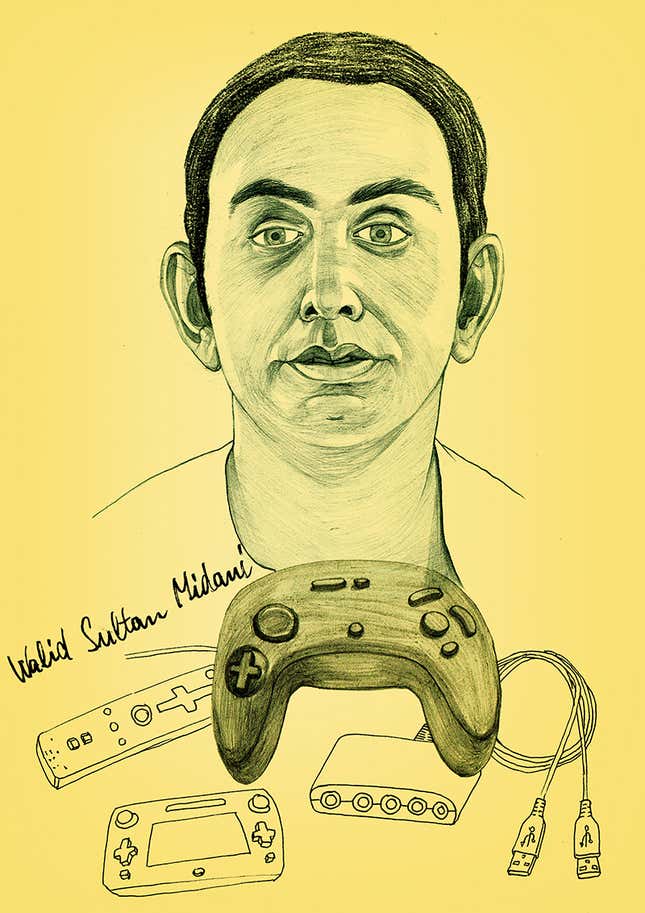
Walid Sultan Midani
Founder, Digitalmania
@SultanWalid
Tunisia
Walid Sultan Midani first made a name for himself when he launched Digitalmania, Tunisia’s first video games development company, in 2012. In a country with no schools or programs to train game designers, Midani and his small team had years before started learning the basics of the field through tutorials and YouTube videos. For the IT engineer, Tunisia’s post-revolution transition from authoritarianism to democracy in 2011 emboldened his vision to create a truly global company.
Over the years, Digitalmania has released almost 90 games on both Facebook and mobile app stores like Google Play and Apple. The studio has also designed games for clients all over the world, including brands like Coca-Cola and LG, and non-governmental organizations like Mercy Corps and the United Nations Development Program. The company has also produced socially-conscious apps and games for the Tunisian market, aimed at tackling corruption or rating politicians during elections.
Running Digitalmania has not been without its challenges. The fact that Facebook and Google do not support merchant payments in Tunisia has hindered their ability to charge for apps and generate cash. But that isn’t deterring Midani, who is also the co-founder of Boost, a Tunisian accelerator, and the director of the Tunisian chapter of the American incubator, The Founder Institute.
“I don’t just want to survive,” Midani says. “I want us to come up with the next Angry Birds or Farmville.”
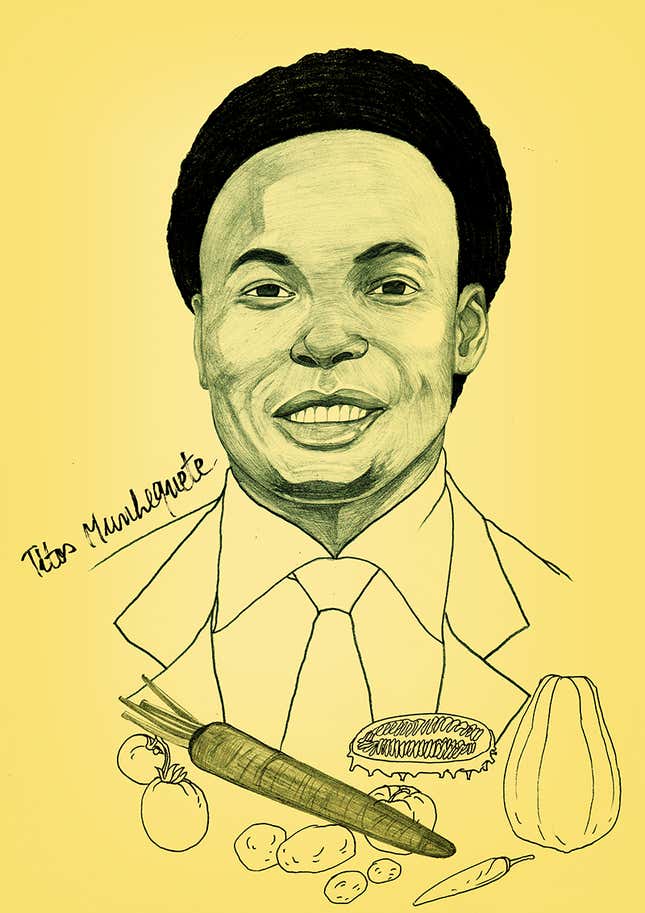
Titos Munhequete
Founder/CEO, Izyshop.co.mz
@RealTMel
Mozambique
Many shoppers in Africa’s urban areas know how frustrating it can get to shop at brick and mortar stores. Often, they have to contend with gridlocked traffic just to get to stores of their choice, a vexing search for items, long queues coupled with slow service at counters and wanting customer etiquette. These are some of the unpleasant experiences that Titos Munhequete, a Mozambican entrepreneur, frequently faced whenever he went shopping. He was equally aware of the challenges farmers and producers confronted just to sell their merchandise, despite being the backbone of the economy.
In 2015 he capitalized on these inadequacies by establishing Izyshop, an online supermarket linking consumers with producers and suppliers. It also provides consumers a platform to access services and products from retail, entertainment, education, healthcare, employment, and financial services. Munhequete believes Izyshop has helped thousands of small producers raise their incomes from $20 per month to $100 by connecting them directly to consumers.
“The experience has been amazing. We are increasing the number of smallholder farmers working with us and the client base is increasing substantially,” he tells Quartz.
Munhequete’s plan is to scale Izyshop to other locations in Mozambique. With the potential to reach out to the 300 million small and medium-sized producers across Africa, Izyshop plans to expand to other countries in the region from 2019. The main challenge has been funding to support growth.
“So far we’ve, been self-funded and the velocity at which the business is growing demands more funds at this stage,” he says.
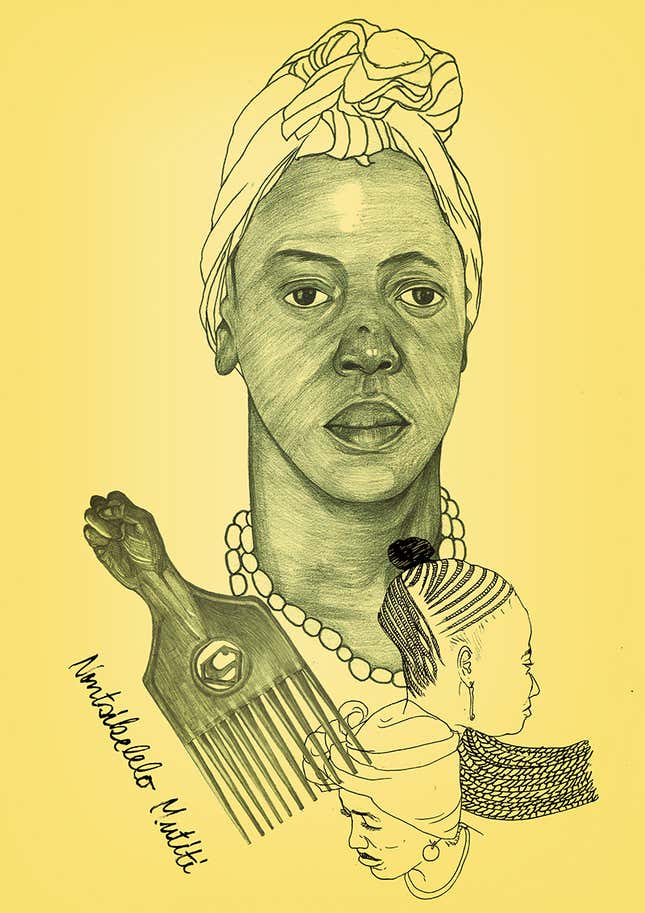
Nontsikelelo Mutiti
Digital artist
@NontsiMutiti
Zimbabwe
In the braiding techniques used by African women, Nontsikelelo Mutiti saw ancient innovations that could be applied to African design. Mutiti wants to move these ancient techniques and designs forward by situating them in digital technology. Teaching digital design, Mutiti challenges her students to use African artifacts as a source for their contemporary design ideas. As an artist and educator, Mutiti refuses to let African techniques be relegated to museums or colonial era photographs. Instead, that history is translated into preset commands, algorithms, and plugins.
“In my practice, I try not to look at African material culture as something that is antiquated,” Mutiti told Quartz. “I look at them on a continuum of technologies.”
As an artist living between Harare and New York City, Mutiti uses 3D printing and laser-cutting to produce and innovate on the patterns and styles of hair braiding, using surprising materials like screen-printed tiles.
Mutiti’s art also explores issues of identity, globalization, and the intimate lives of black women through hair braiding. From the business cards of Harlem’s African braiders to the “simple magic” of combs, Mutiti’s research, art, and design illuminate the stylistic innovations, commercial exchanges, and social interactions behind braided hairstyles.
In her web-based digital art piece Morning O, for example, Mutiti captures a conversation familiar to any woman who has visited a salon to have a hair braided: “It could go up up up up up and then this is just free.” Mutiti’s work forces audiences and artists to reconsider their relationship to African innovation and long overlooked sources of design and art.
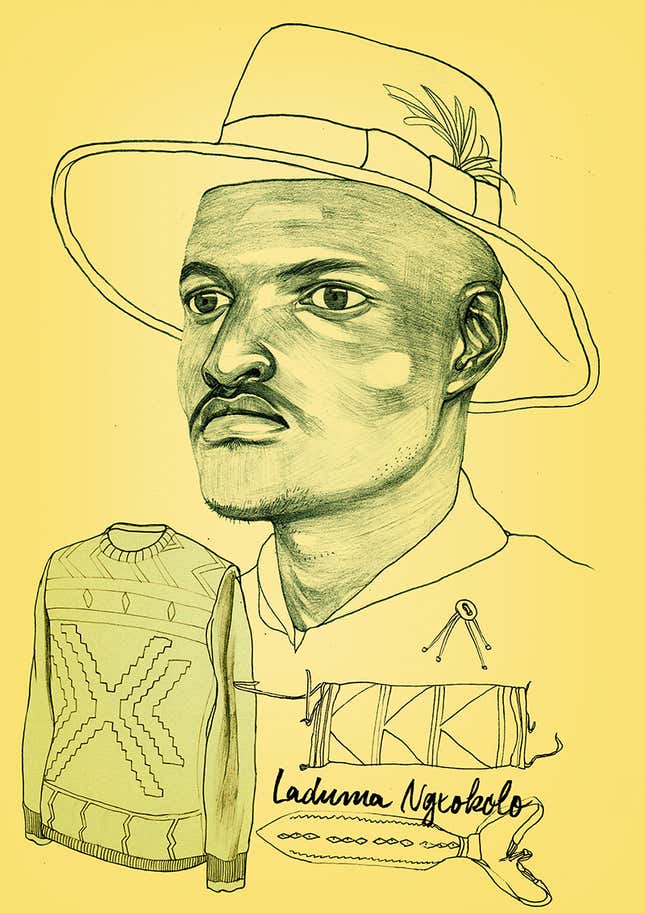
Laduma Ngxokolo
Founder, MaXhosa
@LadumaNgxokolo
South Africa
Designer Ngxokolo is the founder of the luxury knitwear brand, MaXhosa, which draws inspiration from Xhosa culture in South Africa. Ngxokolo, born in Port Elizabeth, started making knitwear at 16 and began planning his knitwear line while at university.
MaXhosa began as a design concept: Ngxokolo wanted to create modern clothing for amakrwala, young men participating in traditional Xhosa initiation ceremonies who are expected to wear formal clothing for six months after the ceremony. Ngxokolo’s goal was to both modernize and revive elements of Xhosa culture by using the colors and motifs of Xhosa beadwork in his clothing, made with mohair and locally-sourced wool.
The MaXhosa shawl won Design Indaba’s “Most Beautiful Object in South Africa” award last year, and Ngxokolo is also the recipient of the 2010 Marie Claire Prix De Excellence for best emerging designer award, and the 2015 Vogue Italia Scouting for Africa Award. His work has been featured in the Cooper Hewitt Smithsonian Design Museum in New York City and admired by the likes of Beyonce. He studied at the Nelson Mandela Metropolitan university in Port Elizabeth and Central St. Martins in London.
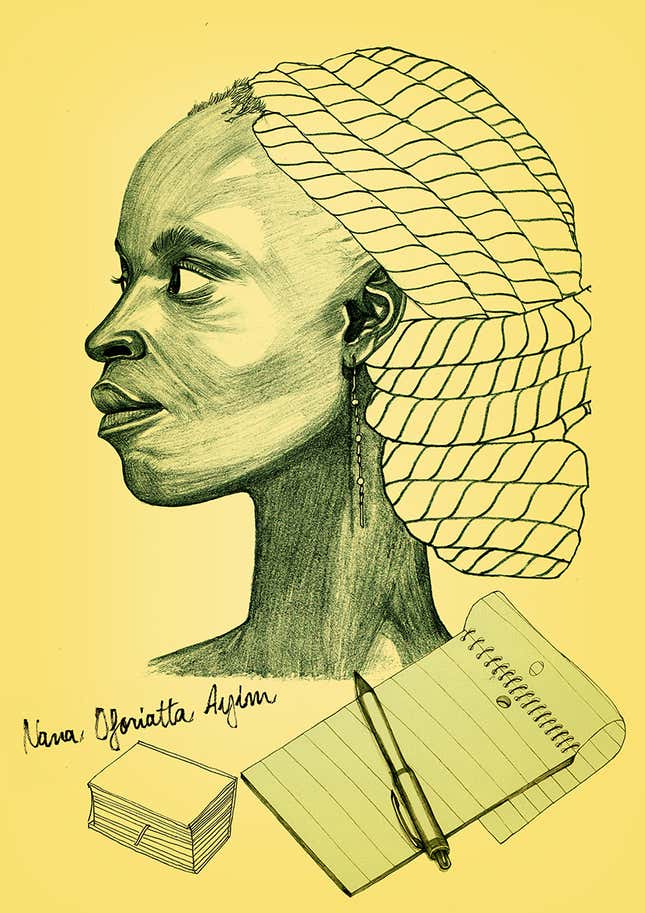
Nana Oforiatta-Ayim
Founder ANO arts institution, creative director Gallery 1957.
@ANOGhana
Ghana
Nana Oforiatta-Ayim’s work focuses on surfacing and celebrating African art, challenging historiographies of the continent, and transforming social contexts.
One of the leading ambassadors of African contemporary art, Oforiatta-Ayim founded the non-profit arts institution ANO in Accra 15 years ago, and recently established a gallery there focused on contemporary Ghanaian art.
The artist, art historian, and filmmaker is trying to bring the study of African art out from the “history of silence” surrounding its movement and dissection.
To this end, Oforiatta-Ayim began three years ago to work on the African Cultural Encyclopaedia, a project to document and archive Africa’s contributions to art, culture, social sciences, in an effort at “re/ordering knowledge, narratives and representations from and about the African continent.” The encyclopaedia has started as a digital platform with user-generated content, Wikipedia style, but will eventually constitute 54 printed volumes, one for each country, with physical exhibitions of elements of the project.
Oforiatta-Ayim’s devotion to surfacing the roots of African art, unobscured by non-African interpretations, extends to its display. Last year, she launched a ‘kiosk museum’ in collaboration with architect DK Osseo-Asare, travelling to ten regions across the country with art and artefacts.
In challenging the white box gallery display, Oforiatta-Ayim told The Guardian of the importance of asking “How suitable is this model for the context we inhabit? Especially [as we are] coming out of the post-colonial moment—a moment in which we were defining ourselves largely based on a western model.”
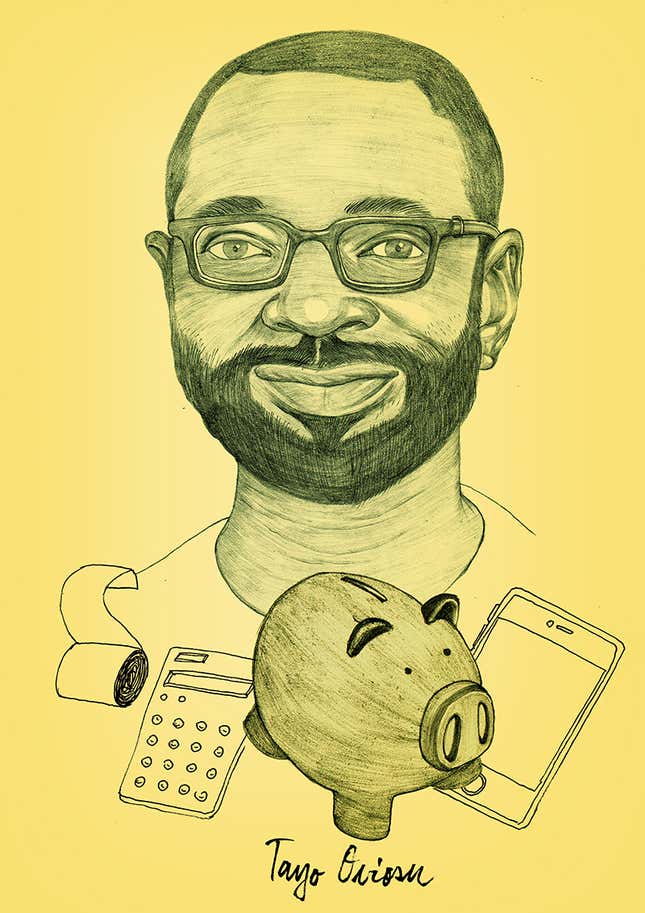
Tayo Oviosu
Founder, Paga
@oviosu
Nigeria
Many startups have tried to replicate Kenya’s success with mobile money in countries where large swathes of the population are unbanked. Not all of them face the intense regulatory environment presented by Nigeria. Tayo Oviosu has managed to navigate that environment, finding success with Paga, a mobile money payments company that lets users send and receive cash online, pay bills and purchase airtime, whether or not they have bank accounts.
Even though Oviosu’s Paga received its license from Nigeria’s Central Bank in 2011, the results of his hard work have only recently become clear. The company has built a strong network of over 11,000 agents, which Oviosu describes as the “single largest network of financial access points in Nigeria.”
Paga has become crucial to dealing with Nigeria’s financial inclusion problem. The company provides financial services to some of the “70% of Nigerian adults” who don’t have bank accounts, Oviosu estimates.
In March, Paga reached six million customers, a major milestone. But Oviosu says they’re just getting started. “We want to help individuals pay and get paid,” he has said. “We do not care if you are banked or unbanked.”
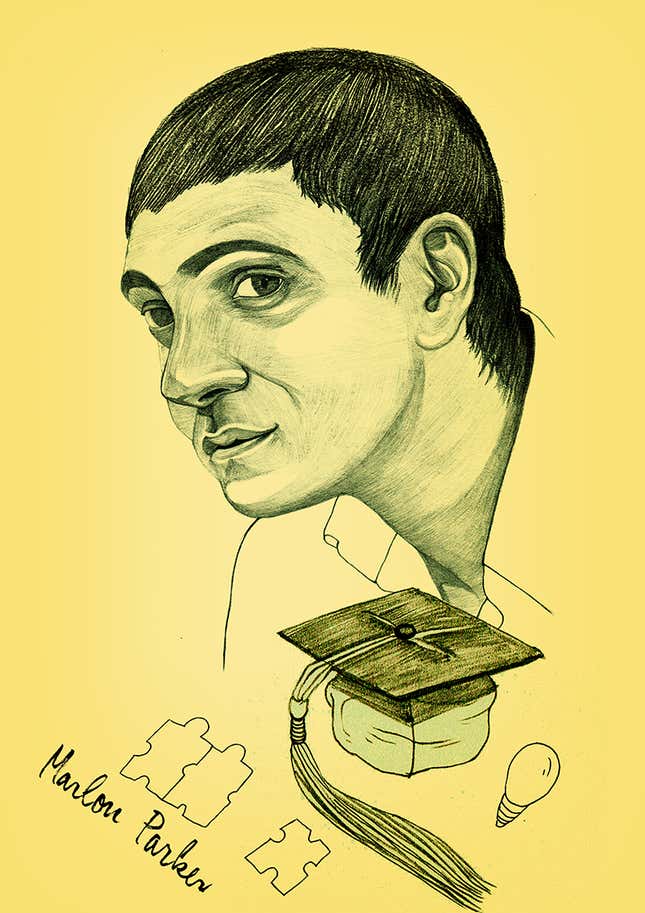
Marlon Parker
Founder, RLabs
@MarlonParker
South Africa
Marlon Parker approaches social issues with the eye of an entrepreneur, trying to find sustainable, effective, and innovative solutions.
Parker founded RLabs (Reconstructed Living Lab) in Cape Town in 2008 to try apply those innovative solutions to some of the social problems confounding South Africa, including crime, poverty, and marginalization.
One of the organization’s most high-profile programs allows community members to earn digital currency for doing good deeds, which they can then exchange for things like food at participating stores, haircuts, or courses at RLabs-run “Youth Cafes.” More than 21,000 South Africans have participated in the program so far, which has been replicated in other countries, including the US, where they recently incorporated it Waco, Texas, Parker says.
Parker has received numerous accolades for his work, and in 2014 he met with Hillary Clinton, then US secretary of state, as part of an African leadership and innovation summit in Washington DC.
RLabs now employs more than 100 people and also has a consulting arm and social tech incubator, supporting nearly 50 startups and more than 25,000 graduates across Africa.
“The adoption of mobile technology has given us the opportunity to scale our impact through leveraging this channel as a vehicle for change. As much as people use technology to communicate and to be informed, we believe we can also maximize it to drive education, entrepreneurship and development services to those who need it most,” Parker told Quartz. “Everything we do is still core to our vision of developing [and transforming] through innovation, technology, education and entrepreneurship.”
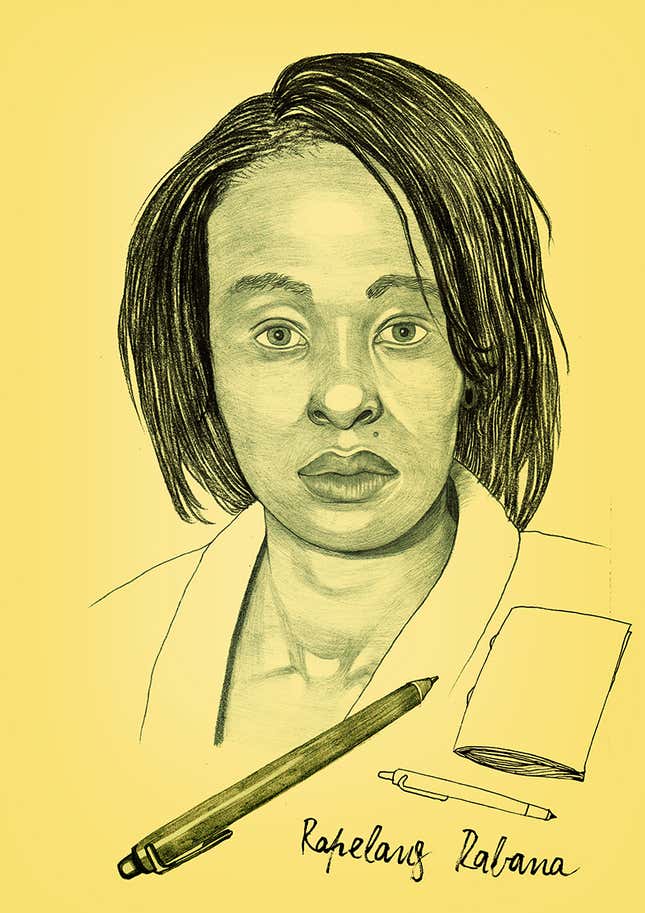
Rapelang Rabana
@rapelangrabana
Founder, Rekindle Learning
Botswana
At 22, the idea of “playing the system” did not appeal to Rapelang Rabana. Instead, she already knew she wanted to be an entrepreneur, and to decide how she spent her time and applied her focus. So after graduating from the University of Cape Town, Rabana started Yeigo Communications, which provided a free VoIP application for mobile phones.
In 2009, Yeigo was acquired by Swiss-based company Telfree. By that time, the frustrations of an uncompetitive and over-regulated mobile landscape had taught Rabana a few key lessons about innovation and the market.
“We wanted to build solutions, not do telecoms wars,” she told Quartz.
The solution she’s now trying to solve is how to use technology to support efficient and impactful learning at all stages. Rekindle Learning doesn’t just upload PDFs and PowerPoint presentations for people to consume, but rather seeks to understand how interactivity can help students retain knowledge.
This search for solutions is the driving force behind Rabana’s work as an entrepreneur and innovator. “It starts with the conviction that something should be different, which is, I think, the beginning of entrepreneurship,” she says. “I leverage my technology skills to then create a solution.”
In her additional role as a speaker, Rabana encourages African innovators to find solutions in their own communities, and trust in their own perspective, rather than competing with the next big thing on the global market.
“I was never smarter than most people in the room, I had no more financial or social capital than anyone else in the group,”Rabana says. “I simply trusted that I have a legitimate perspective.”
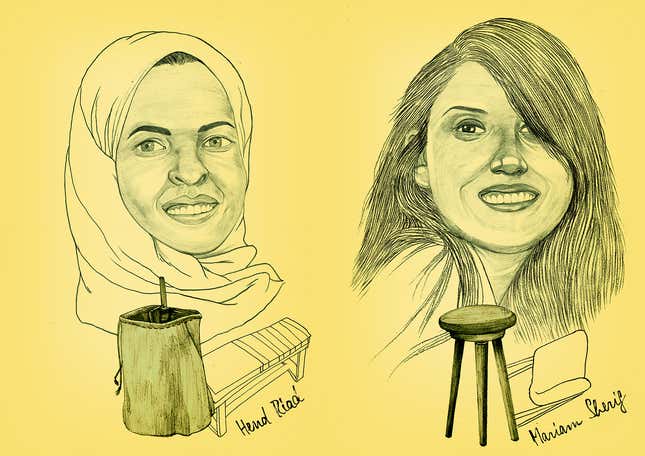
Hend Riad & Mariam Sherif
co-founders, Reform Studio
@ReformStudio
Egypt
Hend Riad and Mariam Sherif are the co-founders of Reform Studio, an award-winning design studio based in Cairo. The studio specializes in creating durable and eco-friendly products, ranging from furniture to woven fabric.
The company’s story started in post-revolution Egypt in 2012, when Riad and Sherif were experimenting with ways to tackle its waste and pollution problems. After doing various experiments, Riad and Sherif came up with Plastex, an environmentally-friendly fabric made by handweaving plastic bags using ancient techniques. Combined with natural jute fibers, the studio has used fabric to make rugs, bags, stools, and placemats. Plastex is also used to produce the colorful Ahwa and Grammy chair collections. Using a traditional Egyptian handloom, the studio hopes to revive an interest in weaving, which is a dying craft across the North African nation.
Reform Studio was also recently invited to collaborate with IKEA, which wants to tap into the “creative explosion” taking place across Africa. The two designers recently worked on on IKEA’s first-ever, all-African collection at the Design Indaba in Cape Town. The collection will be launched in 2019.
As Riad told Quartz Africa, “We want to be in every home to spread our message about sustainability.”
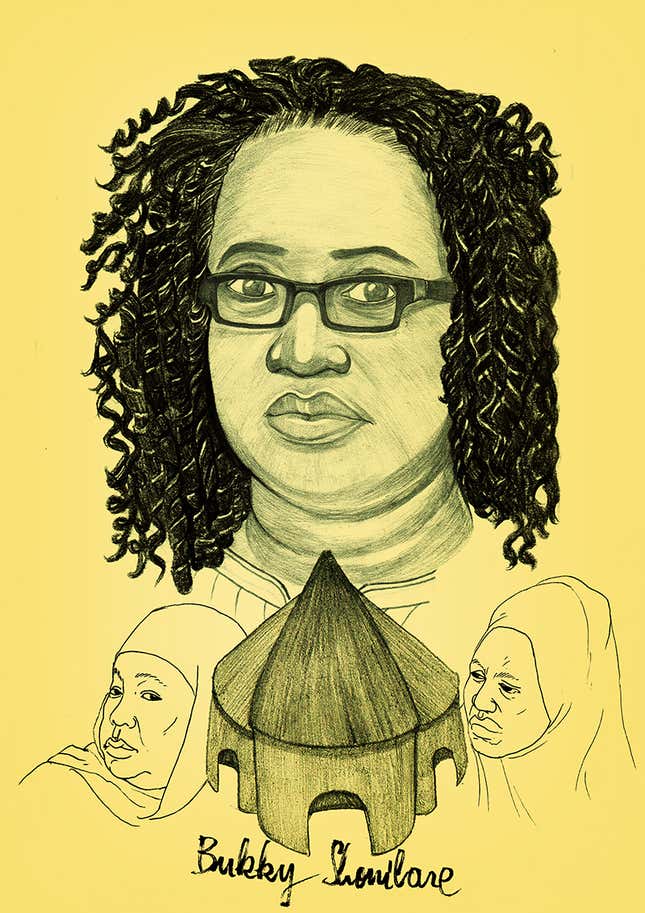
Bukky Shonibare
Activist, Coordinator, Adopt-A-Camp
@BukkyShonibare
Nigeria
In April 2014, the kidnapping of over 270 schoolgirls in Chibok, a town in northeastern Nigeria, made global headlines. Three years later, while some of the girls have been released and rescued, a majority remain in captivity. And Bukky Shonibare remains at the forefront of the #BringBackOurGirls campaign, demanding the government does more to ensure their safe return.
Shonibare’s activism has also seen her take initiative through social impact programs like Adopt-A-Camp, a collaborative effort to provide amenities to the thousands of Nigerians displaced by a seven-year insurgency led by the militant group Boko Haram.
Last year, having raised $28,000 through donations, Adopt-A-Camp built learning hubs, toilet facilities, and a health center at a camp in Borno, a state with the highest number of displaced people. Adopt-A-Camp says over 6,000 displaced people in three camps have benefitted from its donations.
Last year, Shonibare was named a Mandela Washington fellow. Alongside Adopt-A-Camp, she is working on a project to push for better access to education for girls in Nigeria’s rural areas.
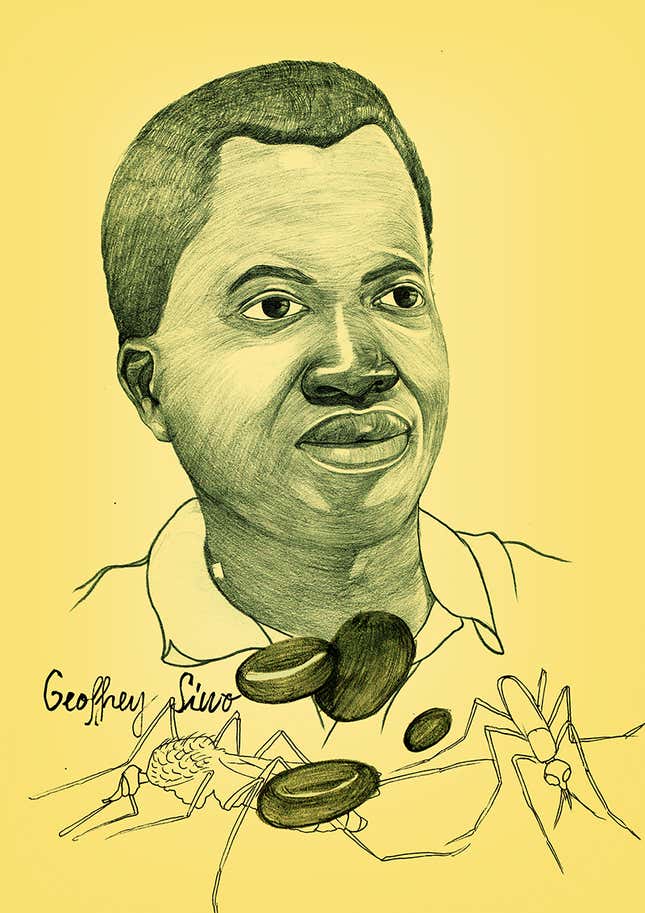
Geoffrey Siwo
Biologist, IBM Research Africa
@gsiwo
Kenya
More and more Africans are dying of cancer, and yet little is known about how the disease develops on the continent or even the extent to which it affects Africans. Biologist Geoffrey Siwo is determined to change this. Like many in his field, curing cancer would be “a moon shot.” First, Siwo wants to map the development or metastasis of the disease, how cancer cells originate and migrate through different parts of the body.
Metastasis remains a “bottleneck,” causing 90% of cancer-related deaths and leading to the pain and clinical complications many cancer patients experience, Siwo tells Quartz.
As a scientist at IBM Research-Africa, Siwo has designed an algorithm that maps characteristics left behind by metastasizing cancer cells in order to create a molecular map of the cell. This cartography of cancer will show how the disease’s pathways might differ in the DNA of Africans.
“You can imagine the impact that maps of the world have had on the ability of humans,” said Siwo. “Something equally magical is happening in biology.”
It was a science lesson in primary school that provided the roadmap for Siwo’s own career, after a teacher explained how the body’s own cells could go rogue, causing cancer. This fascination led to a career in biology and innovative research into the pathways of cancer cells in the human body.
“Cancer epitomizes in so many ways the complexity of life,” Siwo says. “Understanding cancer will also equip us with an understanding of many areas of biology, and therefore ways of developing diagnostics and treatments for diseases beyond cancer.”
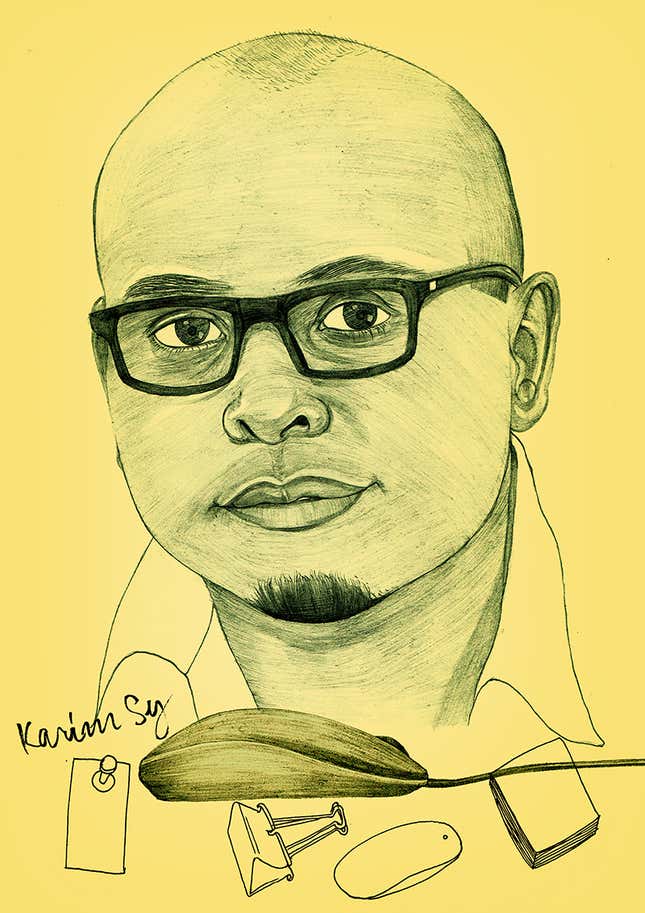
Karim Sy
Founder, Jokkolabs co-working space/tech hubs
@ksyDaily
Mali
Tech entrepreneur, Karim Sy has taken a leading role in ensuring Francophone Africa is involved in global conversations about tech innovation, opening a network of co-working digital hubs in nine countries. In October 2010, he founded Jokkolabs, a non-profit tech hub in Dakar, Senegal, which he hoped would embody a dynamic “open source” (link in French) environment, mimicking the way unfettered access to software “allows systems to communicate with each other and serve the collective interest.” At Jokkolabs, young African entrepreneurs from diverse backgrounds meet to innovate, learn, share values of openness, and collaborate, rather than compete.
With these mutual motivations (link in French), young innovators are not only able to enrich themselves with a diversity of knowledge and experiences, but also exploit the opportunities available in the digital space to create new businesses, and solve problems.
“The approach pursued is that of open and communal innovation, networked to invent new ways of doing things, to innovate but together,” says Sy.
Sy also believes that children are born innovators, so he created Jokkokids, an offshoot of Jokkolabs, to provide them with access to digital technologies and space to explore them. In the process, Sy says the kids are able to express their creativity and “develop their potential by solving problems through play, experimentation and self-expression.”
Beyond Senegal, Jokkolabs co-working spaces have expanded to Mali, Ivory Coast, Benin, Burkina Faso, Cameroon, Morocco, The Gambia and France.
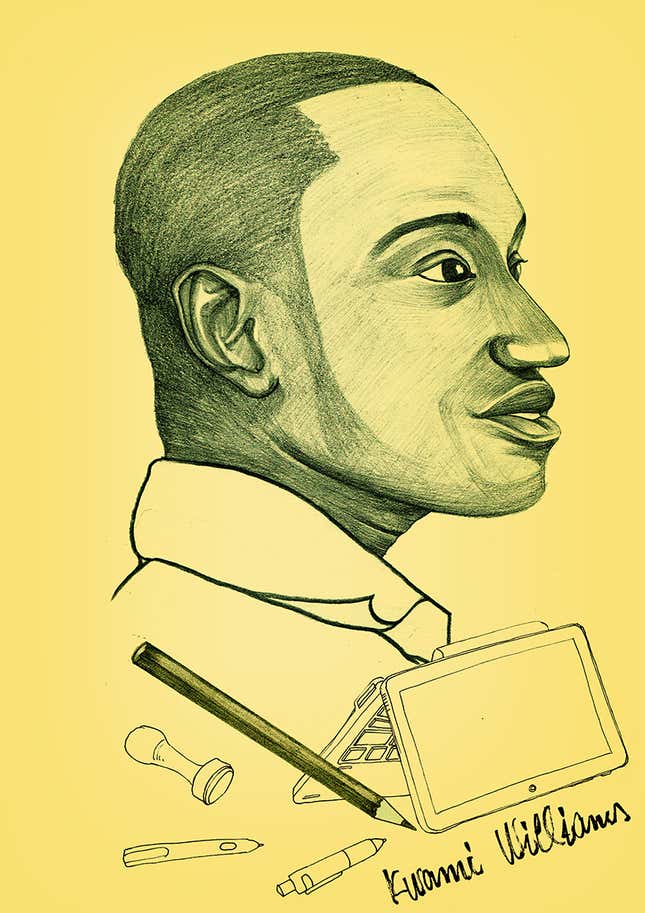
Kwami Williams
Founder, Moringa Connect
@truemoringa
Ghana
Until he saw how impoverished farmers in his home country of Ghana were, Kwami Williams was set on becoming a rocket scientist. Now, he runs an agribusiness that combines training, technology, and a vertically integrated supply chain, to ship products derived from a sturdy, nutrient-dense tree in Ghana to consumers around the world.
Williams, who left Ghana at 8 years old, studied aerospace engineering at Massachusetts Institute of Technology. But a trip home in 2011 led him to restructure his degree—and life plans.
With co-founder Emily Cunningham, Williams set up MoringaConnect ,which works with farmers to extract oil from the seeds of moringa trees—also known as “Miracles Trees“—to use in beauty products. MoringaConnect also sells a tea made from its leaves, which are loaded with vitamin A, protein, calcium, and iron.
MoringaConnect works with more than 2, 500 small farming families throughout Ghana, giving them access to capital and technical training but perhaps most importantly, offering them security: The company purchases almost all of what they grow, and encourages the farmers to use the trees as a valuable food source.
While MoringaConnect has tapped into the international beauty market, Williams wants to find a way to replicate the model with farmers in other moringa-growing countries.
“There are farmers below the poverty line all over the world. If moringa has an income case and a nutrition case for them, we want to facilitate that,” he explained.
Credits
Editor
Yinka Adegoke
List co-ordinator
Lynsey Chutel
Writers
Jackie Bischof
Abdi Latif Dahir
Yomi Kazeem
Stacey Knott
Lily Kuo
Joshua Masinde
Illustrator
Berjo
Art director
Elan Kiderman
Editor-in-chief
Kevin Delaney
